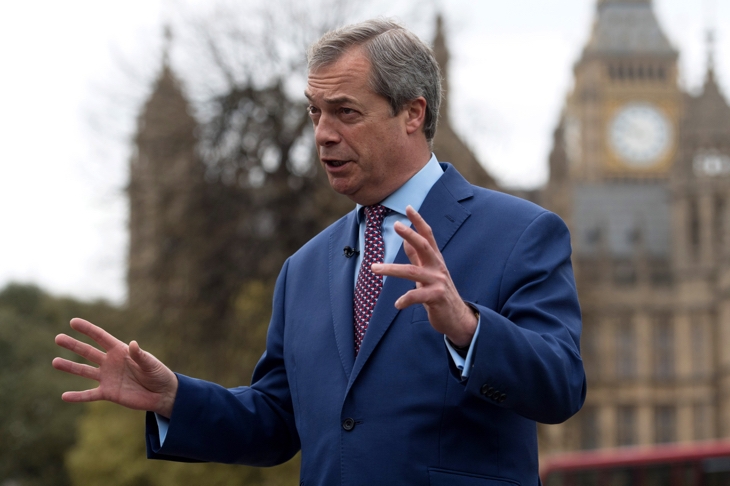It’s easy to mock Nigel Farage over his decision to turn down an ‘easy win’ in Clacton or some other Westminster constituency in preference for the hard graft of the European Parliament and its excruciating regime of expenses and allowances. Easy, but quite likely wrong. Whether or not he ever sets foot in Parliament, Farage can already claim to have changed British history. His role in the Brexit referendum result is debateable; his role in bringing about that referendum isn’t.
Just in case the story needs retelling, Farage did it by forming a connection between two issues: Europe and immigration. Until that linkage was made, Ukip was an ignorable splinter of the Conservative Party. Afterwards, it was a movement capable of scaring David Cameron and his party into gambling Britain’s EU membership.
And now it’s dying, like a bee after stinging. Farage fans say Ukip’s decline is happening because he’s stepped away. The opposite is more accurate: he’s stepping away because the party’s moment has passed.
So now what? Not long ago there was talk of a Farage move to the US, to build on (and cash in on) his relations with the Trump White House. That was always a little fanciful, but the waning of Steve Bannon’s fortunes make it all the more so.
And besides, Farage is an addict. Like a lot of the other politicians he says he has nothing in common with, he’s hooked on the game. And he thinks he can win a lot more than Douglas Carswell’s cast-off seat and a bit-part in a Parliament dominated by Theresa May.
He might just be right too.
Because the opportunity to upend the Establishment may yet come again – and using the same issues too.
All the signs are that Brexit is going to disappoint a lot of people, people who think Brexit means the sort of cut in immigration they’ve wanted for many years.
Talk to just about any minister or official and they’ll tell you that even if free movement technically ends in 2019, European immigration won’t. They’ll tell you that our industries, our public services and our public finances all need European talent and industry. They’ll be right too. Sadly few of them will say so openly, though they’ll whisper it to businesses and other EU governments.
In public though, we’re back to a situation that Farage knows well, and relishes: ministers making promises on immigration they don’t really believe in or really intend to deliver. Incidentally, I don’t include Theresa May in that category – I think she believes in the ‘tens of thousands’ nonsense – but her colleagues all know it’s nonsense.
And where does the continued commitment to that nonsense leave us? There are two possible outcomes. First, May actually does it and slams the doors shut – then tries to deal with the economic, social and diplomatic pain that follows.
Or second, she fails to deliver. Net immigration stays high enough to bother the electorate: EU nationals remain a part of British life, perhaps through a transitional deal that lasts into the 2020s.
Maybe that outcome can be made politically sustainable, through a campaign of patient, honest explanation and leadership, and sensible new policies to make the benefits of immigration more visible and tangible. (Here’s one I made earlier.)
I honestly hope that’s the path May chooses. I think she’s well-equipped and well-placed to lead British politics to a more sensible and honest debate about the benefits of immigration, if she wants to. If she takes that path, she deserves all the support and help that we on the pro-immigration side of the argument can give her – though she may not want it, given how badly we’ve often made our case in the past.
Or maybe she won’t try. Maybe that campaign to shift opinion doesn’t happen, and politicians, led by the PM, simply go on telling voters that immigration is a problem while failing to solve that problem.
If that’s the way it goes, who benefits from the inevitable wave of public anger at an establishment ‘betrayal’ over immigration and Europe? A wave of anger made all the more intense by the expectations raised by the Brexit vote?
You know who.
And if this does all come to pass, if the immigration-slashing dreams of Brexit-backing voters are dashed by politicians who promised and failed to deliver once again, then it won’t matter a damn that Nigel Farage doesn’t have a seat in the Commons. In fact, it might even help. After all, it’s easier to burn down a building if you’re not inside it.
James Kirkup is Director of the Social Market Foundation







Comments